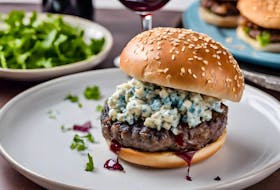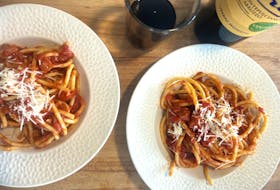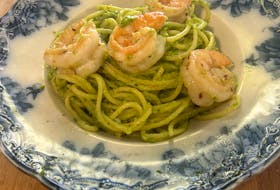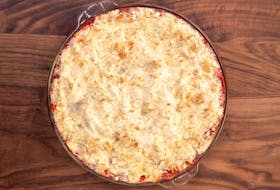Our cookbook of the week is My Korea: Traditional Flavors, Modern Recipes by Hooni Kim. Over the next two days, we’ll feature another recipe from the book and an interview with the author.
To try another recipe from the book, check out: Warm tofu with kimchi and pork belly stir-fry (dubu kimchi).
The key to making excellent pajeon, says Hooni Kim, is good scallions (a.k.a. green onions). And now is the perfect time to find them as they’ve just come into season. “If you look at the picture, it’s all scallions,” he says. “And that, to me, is a proper scallion pancake.”
Korean pancakes can be a vehicle for any filling you choose, says Kim. Use in-season ramps or garlic chives, slices of spicy fresh peppers (e.g., Korean long green peppers or jalapeños), julienned carrots and onions, or a combination. For one of his favourite versions — hamul pajeon — add fresh shrimp and squid (170 g, cut into bite-sized pieces) to the batter.
To make the pancakes as crisp as possible, Kim recommends keeping the batter in the freezer, and his use of carbonated water adds lightness. Often paired with makgeolli — South Korea’s most ancient alcoholic beverage, a cloudy rice wine — pajeon were among the traditional dishes on his restaurant Hanjan ’s first menu.
“I think every Korean restaurant serves it. It’s a very easy dish to make and it’s really delicious,” says Kim. Since scallions can be expensive for restaurants in the off-season, you’ll often find a different ratio of vegetables to batter than you see here. “Instead of using a lot of scallions, they use a lot of batter because the batter is delicious, too … But the scallion is the reason why this dish is good — not the batter.”
SCALLION PANCAKES
파전 (Pajeon)
Batter:
2 cups (500 mL) all-purpose flour
1/2 cup (125 mL) cornstarch
2 tsp (10 mL) baking powder
2 tsp (10 mL) sugar
1 tsp (5 mL) doenjang (Korean fermented soybean paste)
1/2 tsp (2 mL) freshly ground black pepper
2 cups (500 mL) ice-cold club soda
1 medium egg yolk
2 tsp (10 mL) minced garlic
3 bunches scallions, cut into 2-inch (5-cm) batons (if the scallions are thick, cut the white parts lengthwise in half before cutting into batons)
About 5 tbsp (75 mL) grape seed or canola oil for frying
Pajeon Sauce (recipe follows)
Step 1
To make the batter, combine the flour, cornstarch, baking powder, sugar, doenjang and pepper in a medium bowl and mix well to blend. Add the club soda, egg yolk and garlic, and mix gently using a whisk. Do not whisk too much, or extra gluten will form in the batter, making it too thick and doughy. Whisk about 10 times, then let the batter rest for 10 minutes in the freezer so any remaining small clumps of flour can dissolve and blend into the mixture by themselves.
Step 2
When you’re ready to make the pancakes, line a sheet pan with paper towels and set aside. Fold the scallions into the cold batter.
Step 3
Set a 10-inch (25-cm) nonstick sauté pan over high heat and add about 1 tablespoon (15 mL) of the oil. When the oil begins to shimmer and just barely smoke, add 1 cup of the scallion batter to the centre of the pan. Using a spatula, spread it out to form a 7-inch (18-cm) pancake. (You don’t want the pancake to touch the sides of the pan, or the edges may burn before the centre is cooked through.) Reduce the heat to medium and cook for 4 to 5 minutes, until the bottom of the pancake has set. Once it has set, gently slide your spatula under the edges of the pancake and lift them, tilting the pan, so some of the hot oil runs underneath the pancake. Then cook for 2 to 3 minutes more, until the bottom is a deep golden brown and crisp. You can check the colour by gently lifting an edge of the pancake with your spatula. Flip the pancake and cook on the other side for 3 to 4 minutes, until it is golden brown on the second side and cooked through. Transfer to the prepared sheet pan to drain. Wipe out the pan, set it back over high heat, add another tablespoon or so of oil and repeat until all of the pancakes are cooked. The finished pancakes can be kept in a low (200°F) oven on a clean sheet pan while you cook the remaining batches, but it’s best to eat them right away.
Step 4
Cut each pancake into quarters and serve with small bowls of the sauce and ice-cold makgeolli.
Makes: 4 or 5 pancakes
PAJEON SAUCE
2 tbsp (30 mL) water
2 tbsp (30 mL) rice vinegar
6 tbsp (90 mL) soy sauce
1 tbsp (15 mL) gochugaru (Korean red chili flakes)
2 garlic cloves, minced
1/4 tsp (1 mL) minced ginger
1 tsp (5 mL) toasted sesame oil
Step 1
Combine all the ingredients in a bowl and mix well. Use immediately, or store for up to 2 weeks in a tightly sealed container in the refrigerator. Shake or stir well before using.
Makes: 1 cup (250 mL)
Excerpted from My Korea: Traditional Flavors, Modern Recipes . Copyright (c) 2020 by Hooni Kim. Photographs copyright 2020 by Kristin Teig. Used with permission of the publisher, W. W. Norton & Company, Inc. All rights reserved.
Copyright Postmedia Network Inc., 2020








